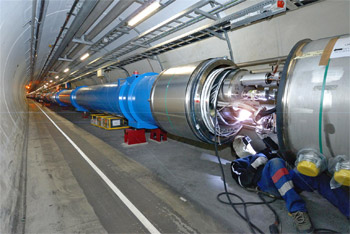The launch of the Large Hadron Collider is postponed.
The European Center for Nuclear Research (CERN) has announced that commissioning of the Large Hadron Collider is being postponed.

Large Hadron Collider (Photo CERN)
Large Hadron Collider (Large Hadron Collider, LHC) will be the most powerful particle accelerator to date. The project was conceived in 1984, and its implementation began in 2001. In the LHC accelerator, located in a 27-kilometer ring tunnel, accelerating proton beams will collide with energy up to 14 tera-electronvolt 40 million times per second. The collider is expected to detect the so-called Higgs bosons and, accordingly, to test the theory that the mass of elementary particles depends on their interaction with the Higgs field.
')
The delay in the launch of the Large Hadron Collider at CERN is explained by the difficulties encountered during the construction of the facility, as well as the recent destruction of the supporting structure of one of the magnets that make up the accelerator. Initially, test collisions with low energy were planned to be held at the end of the current year. However, the problems that arose during the construction of the collider, led to the fact that accelerator testing will begin no earlier than May of next year.
The Large Hadron Collider is expected to generate up to a million gigabytes of data each month. Information processing will be carried out using the power of computing nodes of nearly 160 research organizations located around the world.

Large Hadron Collider (Photo CERN)
Large Hadron Collider (Large Hadron Collider, LHC) will be the most powerful particle accelerator to date. The project was conceived in 1984, and its implementation began in 2001. In the LHC accelerator, located in a 27-kilometer ring tunnel, accelerating proton beams will collide with energy up to 14 tera-electronvolt 40 million times per second. The collider is expected to detect the so-called Higgs bosons and, accordingly, to test the theory that the mass of elementary particles depends on their interaction with the Higgs field.
')
The delay in the launch of the Large Hadron Collider at CERN is explained by the difficulties encountered during the construction of the facility, as well as the recent destruction of the supporting structure of one of the magnets that make up the accelerator. Initially, test collisions with low energy were planned to be held at the end of the current year. However, the problems that arose during the construction of the collider, led to the fact that accelerator testing will begin no earlier than May of next year.
The Large Hadron Collider is expected to generate up to a million gigabytes of data each month. Information processing will be carried out using the power of computing nodes of nearly 160 research organizations located around the world.
Source: https://habr.com/ru/post/11350/
All Articles